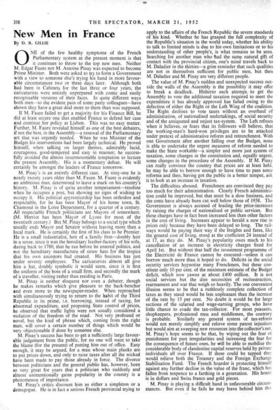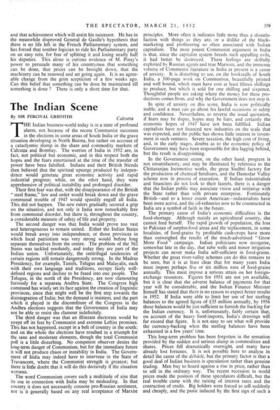New Men in France
By D. R. GILLIE - 0 NE of the few healthy symptoms of the French Parliamentary system at the present moment is that it continues to throw to the top new men.. Neither M. Edgar Faure nor M. Antoine Pinay was expected to become Prime Minister. Both were asked to try to form a Government with a view to someone else's trying his hand in more favour- able circunistances two or three days later. Although both had been in Cabinets for the last three or four years, the caricaturists were entirely unprepared with comic and easily recognisable versions of their faces. In quite different ways both men—to the evident pain of some party colleagues—have shown they have a great deal more to them than was supposed.
If M. Faure failed to get a majority for his Finance Bill, he did at least secure one that enabled France to defend her case and continue her policy at Lisbon. This was no easy matter. Further, M. Faure revealed himself as one of the best debaters, if not the best, in the Assembly—a renewal of the Parliamentary art that was urgently needed. When he was Minister of the Budget his interventions had been largely technical. He proved himself, when talking on larger themes, admirably lucid, courageous, good-tempered and easy in manner; he success- fully avoided the almost insurmountable temptation to lecture the present Assembly. His is a momentary defeat. He will certainly be amongst the leaders of France tomorrow.
M. Pinay's is an entirely different case. At sixty-one he is nearly twenty years older than M. Faure. M. Faure is evidently an ambitious man, determined to leave a mark 'on his country's history. M. Pinay is of quite another temperament—resolute when he occupies a post, but showing no signs of wishing to occupy it. His political apprenticeship has been orthodox and respectable, for he has been Mayor of his home town, St. Chamond in the Loire Department, for a quarter of a century. All respectable French politicians are Mayors of somewhere. (M. Herriot has been Mayor of Lyons for most of the twentieth century.) But M. Pinay belongs to a social type which usually ends Mayor and Senator without leaving more than a local mark. He is certainly the first of his class to be Premier. He is a small industrialist, heir of a family firm—doubly heir in a sense, since it was the hereditary leather-factory of his wife, dating back to 1780, that he ran before he entered politics, and not the hereditary manufacture of straw hats for the tropics that his own ancestors had created. His business has just under seventy employees. The caricaturists almost all give him a hat, doubly symbolic it would seem, since it is first the uniform of the boss of a small firm, and secondly the mark of a traveller, visiting rather than residing in Paris.
M. Pinay is neither eloquent nor even a debater, though he makes remarks which give pleasure to the back-bencher and even more to the newspaper-reader. When reproached with simultaneously trying to return to the habit of the Third Republic in its prime, i.e. borrowing, instead of taxing, for abnormal expenditure, and proposing State control of prices, he observed that traffic lights were not usually considered a violation of the freedom of the road. Not very profound or novel, but the kind of phrase which, coming from the right man, will cover a certain number of things which would be very objectionable if done by someone else. M. Pinay's success has been to get a sufficiently large favour- able judgement from the public, for no one will want to take the blame (for the present) of putting him out of office. Easy enough, it may be argued, for a man whose main planks are to put prices down, and only to raise taxes after all the wicked have been made to pay those already in force. The divorce between politicians and the general public has, however, been so very great for years that a politician who suddenly and almost unintentionally gains popularity in the country is a phenomenon of importance. M. Pinay's critics discount him as either a simpleton or a demagogue. He is in fact a serious French provincial trying to apply to the affairs of the trench Republic the severe standards of his kind. Whether he has grasped the full complexity of the Republic's situation in the world today, whether his ability to talk to limited minds is due to his,own limitations or to his understanding of other people's, is what remains to be seen. Searching for another man who tad the same natural gift of contact with the provincial citizen, one's mind travels back to M. Daladier in the thirties—a grim reminder that such qualities are not in themselves sufficient for public men, but then M. Daladier and M. Pinay are very different people.
The value of M. Pinay's sudden and unexpected success out- side the walls of the Assembly is the possibility it may offer to break a deadlock. Hitherto each attempt. to get the Assembly to vote the additional taxation required to meet the expenditure it has already approved has failed owing to the defection of either the Right or the Left Wing of the coalition. The Right declines to vote taxes without an overhaul of administration, of nationalised undertakings, of social security and of the antiquated and unjust tax-system. The Left refuses when it believes, or fears that its followers will believe, that the working-man's hard-won privileges are to be attacked under pretext of administrative reform and retrenchment. With one Government after another falling over the Budget, none is able to undertake the urgent measures of reform needed to make the State workable—a simpler and more just system of taxation, some changes in the constitution and, equally urgent, some changes in the procedure of the Assembly. If M. Pinay can really convince the country that prices are at least held, he may be able to borrow enough to have time to pass some reforms and then, having got the public in a better temper, ask it to look at an increase in taxation.
The difficulties abound. Frenchmen are convinced they pay too much for their administration. Clearly French administra- tion could be improved, but that must be a slow business, and the costs have already been cut well below those of 1938. The Government is always accused of leading the price-increases by raising the charges of nationalised or public services. But these charges have in fact been increased less than other factors in the cost of living. Increases appear to herald a new rise in prices only because they have been delayed so long. The rail- ways would be paying their way if the freights and fares, like the general cost of living, stood at the coefficient 24 instead of at 17, as they do. M. Pinay's popularity owes much to his cancellation of an increase in electricity charges fixed for April 1st. But without that half the investment programme of the Electricite de France cannot be executed—unless it can borrow much more than it hoped to do. Deficits in the social security services hypnotise many Frenchmen, but these con- stitute only 10 per cent. of the minimum estimate of the-Budget deficit, which now yawns at about £400 million. It is not social services but the dire necessities of reconstruction, rearmament and war that weigh so heavily. The one convenient illusion seems to be that a ruthlessly complete collection of taxes as they stand would be less unpleasant than the increase of the rate by .15 per cent. No doubt it would be for large sections of the salaried and wage-earning groups, who have little chance to evade the tax-collector. For most peasants, shopkeepers, professional men and middlemen, the contrary is probable. Similarly any general system of Mx-reform would not merely simplify and relieve some patent injustices but would aim at sweeping new resources into the collector's net. M. Pinay's hope seems to be that, by wiping out the fear of punishment for past irregularities and increasing the fear for the consequence of future ones, he will be able to mobilise the considerable body of clandestine capital reserves held by private individuals all over France. If these could be tapped they would relieve both the Treasury and the Foreign Exchange Stabilisation Fund. The French hoarder is protecting himself against any further decline in the value of the franc, which has fallen from tenpence to a farthing in a generation. His hoard is in dollars and Swiss francs and gold pieces.
' M. Pinay is playing a difficult hand in unfavourable circum- stances. But even if he fails he may leave behind him this and that achievement which will assist his successor. He has in the meanwhile disproved General de Gaulle's hypothesis that there is no life left in the French Parliamentary system, and has forced that sombre logician to ride his Parliamentary party on an easy rein, for fear of splitting it and losing nearly half his deputies. This alone is curious evidence of M. Pinay's power to persuade many of his countrymen that something can be done, that prices can be brought down, that the machinery can be renewed and set going again. It is an agree- able change from the grim scepticism of a few weeks ago. Can this belief that something can be done be maintained till something is done ? There is only a short time for that:



































 Previous page
Previous page